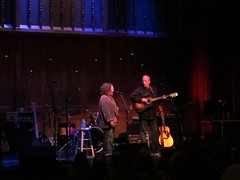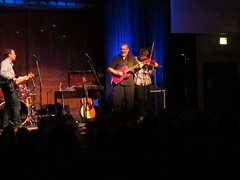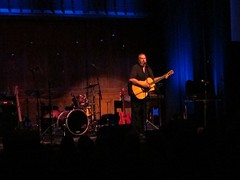The L2 Arts and Culture Center proved to be the perfect intimate setting for this show. The 500 seat hall was sold out, drawing fans of traditional folk and blues music from across Colorado. After so many rowdier bar and arena shows, it was a nice change to enjoy a sit down concert experience. It was a contrast from the last time I saw David Bromberg at the Boulder Theatre. But while the crowd may not have been dancing, they were engaged.
Mollie O'Brien & Rich Moore
 Folk duo Mollie O'Brien and Rich Moore opened the show. Moore's facile fingerstyle playing was impressive, as he slipped fill lines in with the chords and tossed in some bass as well. I love this style of solo guitar work. When a guitarist is as fluid as Moore, he can create a full, busy sound but still drop back to support the vocals.
Folk duo Mollie O'Brien and Rich Moore opened the show. Moore's facile fingerstyle playing was impressive, as he slipped fill lines in with the chords and tossed in some bass as well. I love this style of solo guitar work. When a guitarist is as fluid as Moore, he can create a full, busy sound but still drop back to support the vocals. While Moore provided the accompaniment, Mollie O'Brien covered the singing. Her voice is strong and soulful. When she drops to her deeper range, her tone has the same dark beauty as Linda Rondstadt. The setlist showcased how versatile her voice is. From jazzy folk to up tempo blues, O'Brien tailored her singing to the style perfectly.
While Moore provided the accompaniment, Mollie O'Brien covered the singing. Her voice is strong and soulful. When she drops to her deeper range, her tone has the same dark beauty as Linda Rondstadt. The setlist showcased how versatile her voice is. From jazzy folk to up tempo blues, O'Brien tailored her singing to the style perfectly. I particularly enjoyed their cover of Richard Thompson's The Ghost of You Walks. The original version has a music-box quality. O'Brien and Moore's arrangement breathed more. Just as Linda Thompson changed the character of Richard Thompson's work, O'Brien's interpretation added a deeper emotional component. Moore's guitar was great as he added subtle fills to the ends of phrases. His backing harmony on the title line was perfect.
I particularly enjoyed their cover of Richard Thompson's The Ghost of You Walks. The original version has a music-box quality. O'Brien and Moore's arrangement breathed more. Just as Linda Thompson changed the character of Richard Thompson's work, O'Brien's interpretation added a deeper emotional component. Moore's guitar was great as he added subtle fills to the ends of phrases. His backing harmony on the title line was perfect.While the pair were comfortable on stage and had good patter, their stage presence was fairly static. It would have been nice to see them move around a bit more. The one up tempo blues song (the title might have been Every Night of the Week) kicked up the crowd energy, but otherwise, the vibe was more relaxed.
David Bromberg
 It was a joy to see David Bromberg again. His albums, including the recent Use Me (review here), capture his tasteful playing and a sense of who he is. But on stage, Bromberg's personality shines, whether he's making a clever aside, ranting his way through an over-the-top song ending, or just radiating joy because he's in the middle of some great music. His comfortable style is fully in the moment and he can share that engagement with the audience.
It was a joy to see David Bromberg again. His albums, including the recent Use Me (review here), capture his tasteful playing and a sense of who he is. But on stage, Bromberg's personality shines, whether he's making a clever aside, ranting his way through an over-the-top song ending, or just radiating joy because he's in the middle of some great music. His comfortable style is fully in the moment and he can share that engagement with the audience. The setlist meandered through bluegrass, traditional folk, and screaming blues. Bromberg alternated between playing acoustic and electric guitar, but his backing quartet also shifted instrumentation to back the songs appropriately. The opening song was an uptempo bluegrass/country tune that moved into an old-time music section that eventually featured a rollicking three way fiddle jam, with Bromberg pulling out his fiddle for the only time of the night.
The setlist meandered through bluegrass, traditional folk, and screaming blues. Bromberg alternated between playing acoustic and electric guitar, but his backing quartet also shifted instrumentation to back the songs appropriately. The opening song was an uptempo bluegrass/country tune that moved into an old-time music section that eventually featured a rollicking three way fiddle jam, with Bromberg pulling out his fiddle for the only time of the night. The crowd was happy to follow along with Bromberg, savoring all the facets he showed. I'm more particular to his blues - hearing Bromberg testify as he wails out a guitar line is a special treat - but it's also great to see him work the band during the folk and bluegrass songs, goading them on to have as much fun as he is.
The crowd was happy to follow along with Bromberg, savoring all the facets he showed. I'm more particular to his blues - hearing Bromberg testify as he wails out a guitar line is a special treat - but it's also great to see him work the band during the folk and bluegrass songs, goading them on to have as much fun as he is. Introducing a section of songs from Use Me, Bromberg talked about the projec. The first song in the series was Blues Is Falling, which Tim O'Brien wrote and produced. Bromberg's comments about Tim O'Brien were classic:
Introducing a section of songs from Use Me, Bromberg talked about the projec. The first song in the series was Blues Is Falling, which Tim O'Brien wrote and produced. Bromberg's comments about Tim O'Brien were classic:It's really unfair that there are Tim O'Briens. Tim O'Brien can play beautiful guitar, mandolin, fiddle. Sing gorgeous tunes.Write beautiful songs and it's all as easy as breathing for him. If he wasn't so nice I could really learn to hate him.
 Bromberg's backing quartet was exactly what you'd expect from one of the best side men in the business: talented players, able to adapt on the fly and make each song click. Still, the best moment of the show was with Bromberg alone. As he played some solo guitar, the intimate hall pulled even closer. During Delia, a classic folk blues number, the crowd was rapt as Bromberg played the fingerstyle lines and sang the tune. In between verses, he talked about the true life story of the song as he played his fills. A folk history lesson and beautiful tune, this was a special, bittersweet moment. The sweet singing guitar lines, the mournful lyrics ("she's all I've got, she's gone"), and the quiet reverent feel took the room back to its roots as a church.
Bromberg's backing quartet was exactly what you'd expect from one of the best side men in the business: talented players, able to adapt on the fly and make each song click. Still, the best moment of the show was with Bromberg alone. As he played some solo guitar, the intimate hall pulled even closer. During Delia, a classic folk blues number, the crowd was rapt as Bromberg played the fingerstyle lines and sang the tune. In between verses, he talked about the true life story of the song as he played his fills. A folk history lesson and beautiful tune, this was a special, bittersweet moment. The sweet singing guitar lines, the mournful lyrics ("she's all I've got, she's gone"), and the quiet reverent feel took the room back to its roots as a church. With the rest of the band coming back on stage, Bromberg finished out a powerful set and two encores. Satisfied but never complacent, David Bromberg remains one of my favorite guitarists to see live.
With the rest of the band coming back on stage, Bromberg finished out a powerful set and two encores. Satisfied but never complacent, David Bromberg remains one of my favorite guitarists to see live.More photos on my Flickr.



 Such a heavy title, but
Such a heavy title, but  Like Beats Antique,
Like Beats Antique,  Orchestral and dreamy,
Orchestral and dreamy,  With songs that range from Hawkwind influenced wanderings (
With songs that range from Hawkwind influenced wanderings ( Does
Does 


